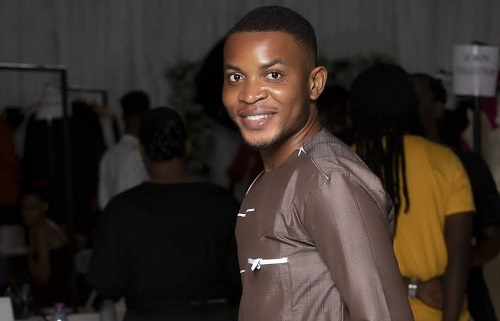![]()

'Fashion Shows' pimping women over selling apparel - Van Calebs
The Ghanaian fashion industry has come under scrutiny, raising questions about its true profitability and the lavish allure it has been associated with in the realm of online publicity and glamour.
Renowned socialite Van Calebs sparked controversy today by asserting that fashion shows in Ghana primarily serve as platforms for seeking "sexual partners" rather than for promoting and selling clothing.
During an interview in Accra, he expressed his views on whether fashion could become the next thriving business for young Ghanaians.
Van Calebs holds a strong belief that fashion shows prioritize models with sexual appeal over showcasing garments. According to him, fashion show organizers have lost sight of their main objective and are now catering to a more receptive and financially rewarding market.
"The focus is no longer on the clothes themselves, but rather on the individuals wearing them... and I say this in a negative sense. Wealthy individuals, often friends of the organizers, attend these shows and cast their eyes upon the beautiful models strutting down the runway. After the event, they request the organizers to provide contact details for some of the ladies, and even some of the male models. Subsequently, they arrange meetings and offer money or opportunities in exchange for engaging in sexual relationships. Hence, these affluent individuals also sponsor the fashion shows financially, which serves as their benefit. In reality, most fashion shows do not generate revenue through ticket sales or designer participation fees, leading to a rather dire situation," he explained.
Highlighting the desperate circumstances faced by many fashion shows in Ghana, Van Calebs added that the majority of these popular shows underpay the models who grace their runways.
"In present-day Ghana, almost all of these fashion shows exploit models, employing them for three or more days of shows and compensating them with a mere Ghc 400 to Ghc 500. Given the absence of cash sponsors and insufficient ticket sales, one wonders where the funding originates," he remarked.
Furthermore, Van Calebs lamented the plight of fashion designers, who serve as the backbone of the industry.
"In Ghana, numerous fashion designers resemble social media bloggers. They enjoy a brief moment of prominence and then fade away, eventually forgotten. Take, for example, our celebrated fashion icon, the late Kofi Ansah. His 'Art Dress' company and collections now gather dust in a garage instead of occupying a fashion studio or boutique. Even Joyce Ababio, once a vibrant fashion designer, has shifted her focus to running a fashion school... presumably because it is more lucrative than being a fashion designer. The list goes on, with many Instagram fashion designers actively engaged in numerous photoshoots, but how many of them are actually making sales and can provide evidence of their success?" he pondered.
Nevertheless, fashion has emerged as a prominent feature on Ghana's lifestyle and entertainment calendar. A well-executed fashion show over the weekend can attract both local and foreign guests to Accra. Moreover, the growing number of students enrolling in fashion degree programs offered by institutions like 'Radford University' and 'Blue Crest University,' as well as the sustenance of numerous fashion schools, offers hope for the future of the fashion industry in Ghana.
